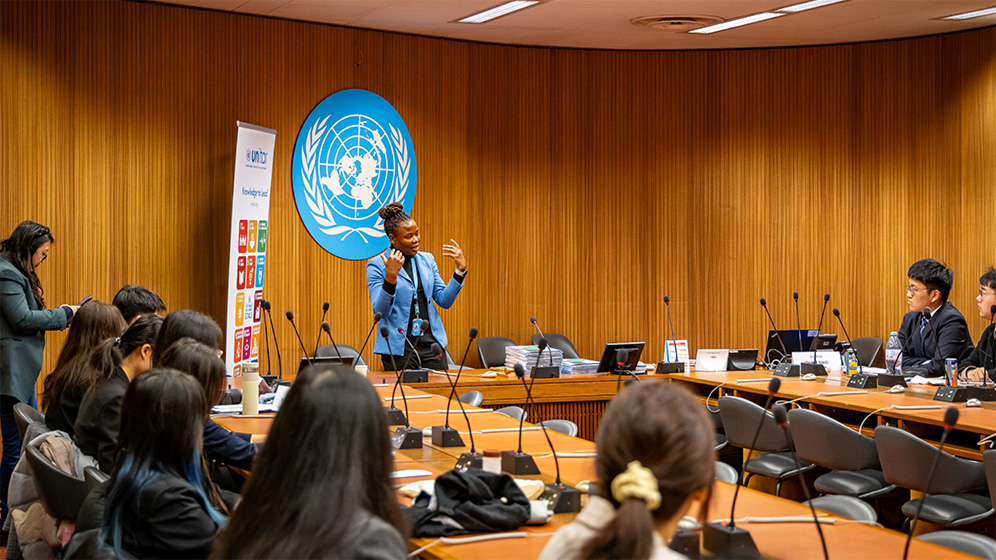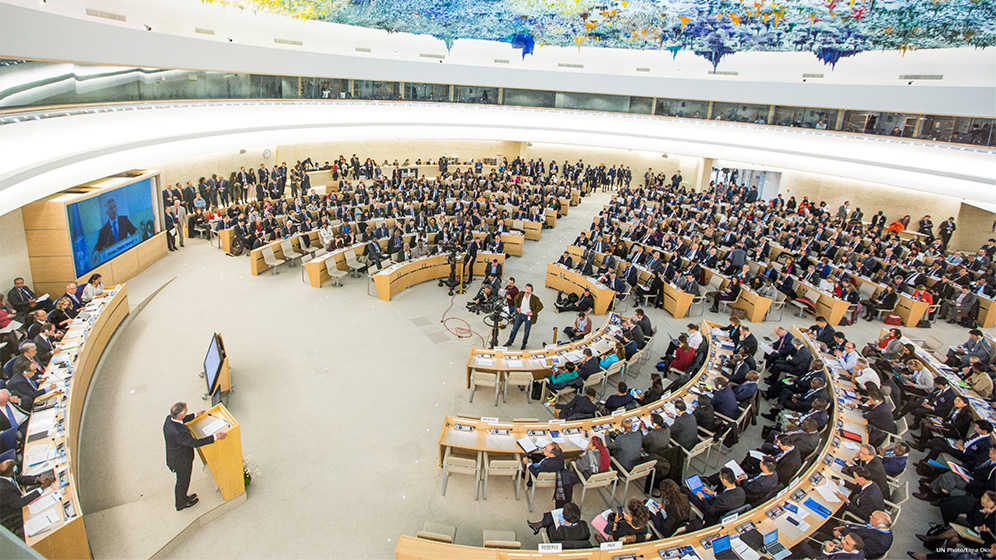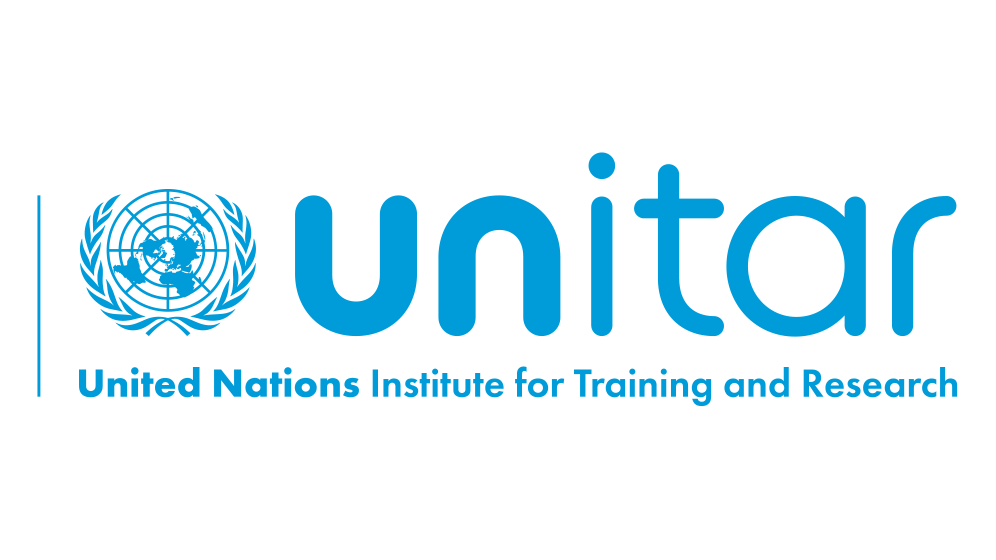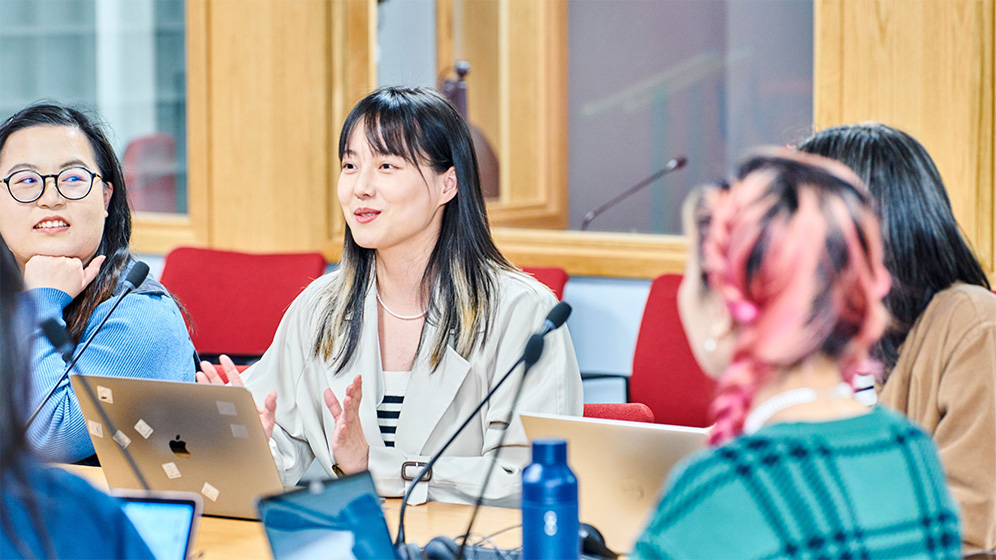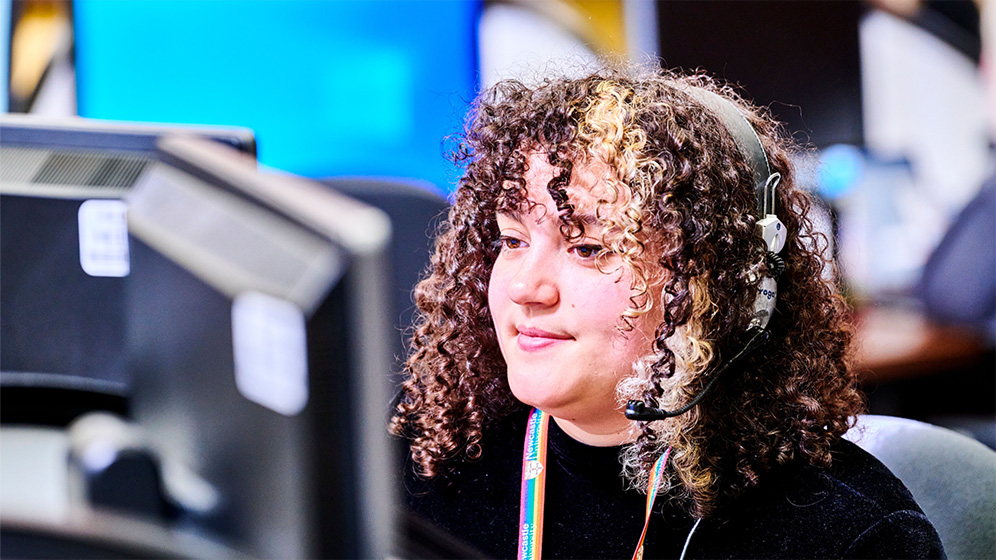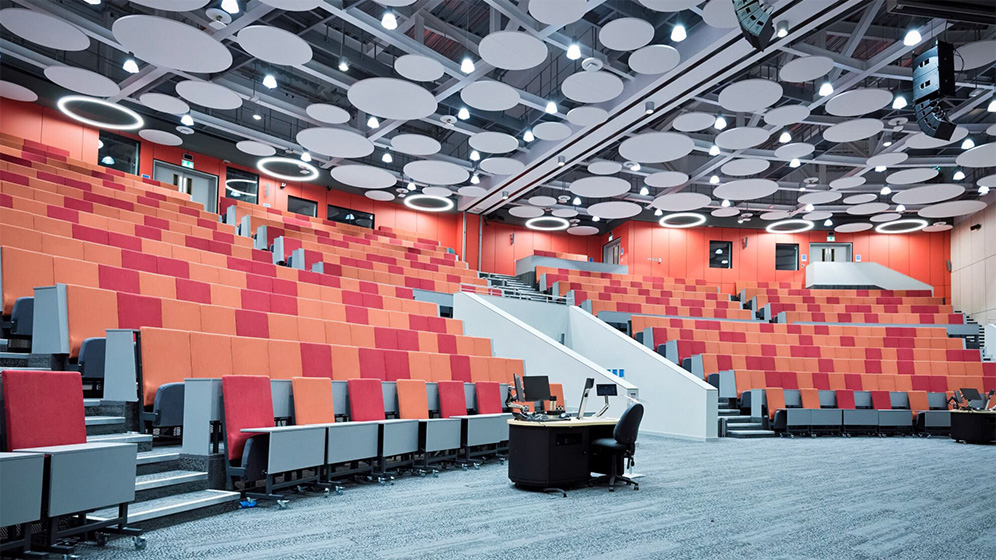Interpreting and Conference Diplomacy MA
This MA is delivered in partnership with the United Nations Institute for Training and Research (UNITAR) and features a UN Geneva residential. It will equip you with the interpreting and diplomacy skills to excel in international and diplomatic settings.
You are currently viewing course information for entry year:
Start date(s):
- September 2026
Overview
This interdisciplinary MA is the only Master’s in Interpreting and Conference Diplomacy delivered in partnership with the United Nations Institute for Training and Research (UNITAR).
UNITAR’s Division for Multilateral Diplomacy provides training in conference diplomacy and UN Career Development.
This course combines Newcastle University’s academic strength with UNITAR’s practical expertise. You’ll gain advanced skills in interpreting and cross-cultural communication for global and diplomatic settings.
This course is open to applicants with linguistic proficiency in both Chinese and English. Graduates from any discipline are welcome to apply.
Find out more about our full suite of Translating and Interpreting courses.
Experience the UN in action
The course includes a 10-day immersive residential at the United Nations Office in Geneva.
As part of this experience you will:
- have the opportunity to observe first-hand the UN system
- gain unique insights into the dynamics of real-world diplomacy
- meet and engage with diplomats, interpreters, and international civil servants
Academic experts in interpreting studies and experienced UN professionals and practitioners deliver this MA Interpreting and Conference Diplomacy.
Important information
We've highlighted important information about your course. Please take note of any deadlines.
Please rest assured we make all reasonable efforts to provide you with the programmes, services and facilities described. However, it may be necessary to make changes due to significant disruption, for example in response to Covid-19.
View our Academic experience page, which gives information about your Newcastle University study experience for the academic year 2025-26.
See our terms and conditions and student complaints information, which gives details of circumstances that may lead to changes to programmes, modules or University services.
What you'll learn
The MA Interpreting and Conference Diplomacy is designed around the following learning aims:
- Interpreting and diplomacy
- develop advanced professional competencies in conference interpreting and diplomatic communication
- gain an understanding of diplomacy and its role in international settings
- AI and the future of interpreting and diplomatic practice
- expand your knowledge of AI tools and platforms used in international forums
- understand their transformative impact on interpreting practice and diplomatic events
- Understanding international organisations
- learn about the core components of the United Nations and its affiliated agencies
- develop career management skills for careers in international organisations
Experiential learning
The MA Interpreting and Conference Diplomacy places an emphasis on hands-on, practical learning to:
- enhance your student experience
- maximise your employability
You will:
- acquire the practical and technical competencies to perform as an interpreting professional using our state-of-the-art interpreting suites
- engage in intensive training in:
- consecutive and simultaneous interpreting
- managing multilingual communication in international diplomatic encounters
- develop a practical understanding of multilateral diplomacy
- acquire key diplomatic skills by participating in Model United Nations simulations
- take part in student-led mock conferences which offer a unique learning opportunity in a simulated real-life environment
- combine case-study analysis and role-based simulations to develop:
- practical and transferable persuasive communication skills
- intercultural competencies
- the ability to mediate international negotiations
Bridging theory and practice
Interactive lectures, webinars, and workshops support your practical experience. These provide you with a foundational understanding of key concepts and debates in interpreting and diplomatic theory. You will learn to use this knowledge to reflect critically on your practical interpreting experience.
You will also be trained in research methods and develop your own research project, opening up the path to doctoral study.
Modules
You will study modules on this course. A module is a unit of a course with its own approved aims and outcomes and assessment methods.
The module information below is intended to provide an example of what you will study.
Our teaching is informed by research. Course content changes periodically to reflect developments in the discipline, the requirements of external bodies and partners, and student feedback.
Full details of the modules on offer will be published through the Programme Regulations and Specifications ahead of each academic year. This usually happens in May.
To find out more please see our terms and conditions.
Optional modules availability
Some courses have optional modules. Student demand for optional modules may affect availability.
You will take the following compulsory modules:
How you'll learn
The MA Interpreting and Conference Diplomacy combines in-person learning on the Newcastle campus with online webinars delivered by UNITAR experts. The course also includes a compulsory 10-day practicum on the UN premises in Geneva. The practicum in Geneva takes place outside term time during Spring break.
In the summer, you will benefit from the support of a supervisor for your dissertation or interpreting project.
Depending on your modules, you'll be assessed through a combination of:
- Computer assessment
- Dissertation
- Essay
- Professional skills assessments
- Oral examination
- Performance
- Portfolio
- Report
- Research proposal
- Written examination
The varied portfolio of assessments reflects the wide range of skills and knowledge acquired throughout the course. Performance in simulated real-life settings (interpreting performance, Model United Nations, negotiation simulation) is a key assessed component.
Throughout your studies, you’ll have access to support from:
- academic staff
- personal tutors and research supervisors
- our University Student Services Team
- student representatives
- peers
You'll also be assigned an academic member of staff, who will be your personal tutor throughout your time with us. They can help with academic and personal issues.
Your teaching and learning is also supported by Canvas. Canvas is a Virtual Learning Environment. You'll use Canvas to submit your assignments and access your:
- module handbooks
- course materials
- groups
- course announcements and notifications
- written feedback
Your development
On completing the programme, you will have:
- developed a deep understanding of international standards of diplomatic communication
- acquired the skills and expertise to perform as a fully-fledged interpreting professional for a global organisation
- developed the ability to apply advanced public speaking, negotiation, and teamwork skills in a diplomatic environment, and facilitate dialogue using mediation frameworks
- gained proficiency in using state-of-the-art interpreting technology, including AI tools and platforms used in international forums
- acquired knowledge of the current and potential applications of AI in international relations, and a critical understanding of the ethical considerations and governance of AI in diplomacy
- developed the ability to select appropriate academic research methodologies, and to design, evaluate and write up an academic research project
Your future
In addition to the academic and practical components of the course, you will have the opportunity to build a strong understanding of how to start a career within the UN system. The course enables you to:
- experience the UN work environment in Geneva first-hand
- benefit from networking opportunities with UN experts and staff members
- take part in tailor-made UN career development sessions
- maximise your chances to secure an internship position in the UN
Careers advice and support
The Careers Service provides tailored advice for international students. This includes the China Career Gateway, an exclusive career development programme for Chinese students studying at Newcastle University.
You will have access to expert advice and support throughout your studies and for up to three years after you graduate. Find out more about our Careers Service at the link below.
Our Careers Service
Our expert Careers Service is here to help you take the next steps in your professional life. We will support you while you’re studying with us and for up to three years after you graduate.
You will have access to expert one-to-one advice and guidance through our campus careers centre and online, along with digital resources, workshops, networking opportunities, and careers and recruitment events.
We’ve been awarded 5 QS Stars for Student Employability (2025). Many of our degrees are shaped by strong links with national and international businesses. We are committed to helping you access real-world experience opportunities and develop key skills through paid work placements and internships.
Quality and ranking
All professional accreditations are reviewed regularly by their professional body
If you’re studying an accredited degree and thinking about working in Europe after you graduate, the best place to find current information is the UK Government’s guidance on recognition of UK professional qualifications in EU member states. This official resource explains whether your profession is regulated in another country, what steps you need to take, and which organisation you should contact.
Facilities
You will train in facilities which replicate professional settings. You will have access to digital platforms for interpreting training and practice.
Our state-of-the-art interpreting suites include a UN-standard conference interpreting suite. The £1.2m suite provides an opportunity for cross-facility learning through video link: it is linked to a lecture theatre on a remote site – the Frederick Douglass Centre on Newcastle Helix – and enables training in remote interpreting. The suite was inaugurated by Christina Edwards, Chief Interpreter at the United Nations Office in Vienna.
In addition to the Philip Robinson Library’s extensive resources in international relations and interpreting studies, you will have access to the United Nations Office at Geneva (UNOG) Library.
Fees, Funding and Scholarships
Tuition fees for 2026 entry (per year)
The course fees are inclusive of the following costs for the Geneva-based Practicum:
• Newcastle-Geneva return flights
• Shared accommodation in Geneva for 13 nights
The Newcastle-Geneva return flights and accommodation in Geneva will be booked by the School of Modern Languages.
As a general principle, you should expect the tuition fee to increase in each subsequent academic year of your course, subject to government regulations on fee increases and in line with inflation.
Depending on your residency history, if you’re a student from the EU, other EEA or a Swiss national, with settled or pre-settled status under the EU Settlement Scheme, you’ll normally pay the ‘Home’ tuition fee rate and may be eligible for Student Finance England support.
EU students without settled or pre-settled status will normally be charged fees at the ‘International’ rate and will not be eligible for Student Finance England support. You may be eligible for a scholarship worth 25% off the international fee. Search our funding database.
If you are unsure of your fee status, check out the latest guidance here.
Scholarships
We support our EU and international students by providing a generous range of Vice-Chancellor's automatic and merit-based scholarships. See our searchable postgraduate funding page for more information.
What you're paying for
Tuition fees include the costs of:
- matriculation
- registration
- tuition (or supervision)
- library access
- examination
- re-examination
- graduation
Find out more about:
If you are an international student or a student from the EU, EEA or Switzerland and you need a visa to study in the UK, you may have to pay a deposit.
You can check this in the How to apply section.
If you're applying for funding, always check the funding application deadline. This deadline may be earlier than the application deadline for your course.
For some funding schemes, you need to have received an offer of a place on a course before you can apply for the funding.
Search for funding and scholarships
Find funding available for your course
Entry requirements
The entrance requirements below apply to 2026 entry.
Qualifications from outside the UK
English Language requirements
Admissions policy
This policy applies to all undergraduate and postgraduate admissions at Newcastle University. It is intended to provide information about our admissions policies and procedures to applicants and potential applicants, to their advisors and family members, and to staff of the University.
University Admissions Policy and related policies and procedures
Credit transfer and Recognition of Prior Learning
Recognition of Prior Learning (RPL) can allow you to convert existing relevant university-level knowledge, skills and experience into credits towards a qualification. Find out more about the RPL policy which may apply to this course
How to apply
Using the application portal
The application portal has instructions to guide you through your application. It will tell you what documents you need and how to upload them.
You can choose to start your application, save your details and come back to complete it later.
If you’re ready, you can select Apply Online and you’ll be taken directly to the application portal.
Alternatively you can find out more about applying on our applications and offers pages.
Apply Online
Open days and events
Find out about how you can visit Newcastle in person and virtually
Overseas events
We regularly travel overseas to meet with students interested in studying at Newcastle University.
Get in touch
Questions about this course?
If you have specific questions about this course you can contact:
School of Modern Languages
Telephone: +44 (0) 191 208 5867
Email: modlang.pgadmin@ncl.ac.uk
General enquiries
For more general enquiries, you could also complete our online enquiry form.
Application enquiries
If you've got a question about your application, send us an enquiry via the application portal you applied through.
If you haven't applied yet, you can send your questions via our enquiry form.
Live chat
Our Ncl chatbot might be able to give you an answer straight away. If not, it’ll direct you to someone who can help.
You'll find our Ncl chatbot in the bottom right of this page.
Chat to our students
Choosing a university is a big decision. If you've got questions about a particular course, student life or the city of Newcastle, why not chat to our friendly students or graduates!
Keep updated
We regularly send email updates and extra information about the University.
